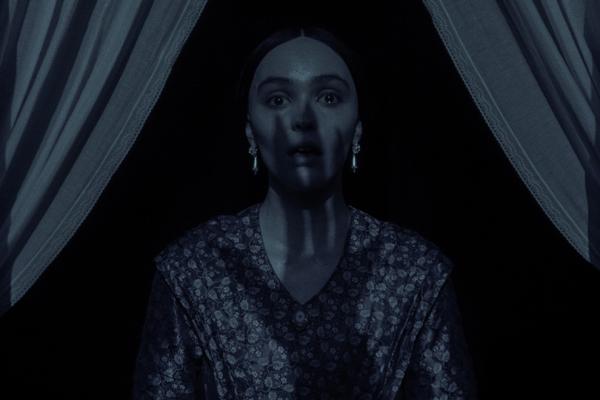Alex Garland’s first three films as writer-director can be viewed as midrashim — scriptural commentary — on the first chapters of Genesis: Ex Machina reflected on the creation of humanity and the divine image, and Annihilation served as a meditation on the creation (and un-creation) of the natural world. His latest film, Men, uses imagery from Genesis 3 to reflect on the culturally assigned guilt of women and the patriarchal system that has perpetuated this guilt through a centuries-long history of interpretation. Starting with a slow-burn sense of claustrophobic dread, then taking a right turn into some visceral body horror in the third act, Men is a tough movie to shake.
The film centers on Harper (Jessie Buckley), a young woman wrestling with both grief and guilt after the death of her husband (Paapa Essiedu). In an early flashback scene, we learn that she was going to leave him, and he threatened suicide in response; shortly afterwards, he either jumped from or slipped off the balcony to his death. Either way, Harper is struggling with knowing that she is not responsible for his death, but nevertheless feeling culpable. She rents a country manor that she hopes will be an Edenic paradise as a place to heal; the first thing she does upon an arrival is eat an apple from the tree in the front yard. When she meets the manor’s owner, Geoffrey (Rory Kinnear), he chides her for eating “forbidden fruit,” instantly establishing what cinematic world we’re in.
Most of the film participates in the kind of horror that could only occur after the Fall. While Geoffrey is awkward, things take a darker turn when Harper sees a naked man, covered with dirt and lacerations, while she’s out for a walk in the woods. She heads back to the manor quickly, but he shows up in her backyard the next morning — and then tries to break into the house as she frantically calls the police.
Not long after this, we begin to realize that all of the men that Haley encounters are all variations on the same face. The naked man in the woods, the local policeman, the vicar, and others are all played by Kinnear, as if they are multiple facets of the same, single Man. And as the film progresses, these men all find more and more things to blame Harper for, including driving her husband to suicide and arousing them. It’s a striking portrayal of how individual men coalesce into the system of Men — a collective that seems single-mindedly focused on blaming women for any problems in their lives.
The narrative of the Fall is a genius backdrop for a film exploring the connections between blame and trauma. When I teach biblical hermeneutics, I frequently ask my class to tell me what they remember about the story of the Garden of Eden before we read it together. Predictably, our culture fills in details that the text leaves unspoken: Students are convinced that the fruit is clearly identified as an apple and that the serpent is explicitly designated as Satan. Neither of these details are canon. Perhaps the biggest surprise comes when I ask the students where Adam was while Eve was conversing with the serpent and eating the apple. They’re shocked to read it through and find that Adam was standing right next to her the whole time (Genesis 3:6). But our cultural legacy holds Eve responsible for bringing sin and death into the world; Adam’s only sin was not keeping a better eye on his wife.
Men functions as an embodied vision of this cultural legacy of blame. Through this elaborate system of doppëlgangers, all focused on blaming Harper for any number of sins, Men demonstrates how the assumption of female guilt has been perpetuated by men (Men?) for centuries. The film shows this through its use of Christian imagery, but isn’t content to stop there: The film’s press materials refer to the naked man in the forest as the Green Man, a pagan symbol of nature and rebirth. And there’s a recurring motif of Sheela-Na-Gig fertility icons, first in the stone carvings of the church, then embodied in the film’s climax. Both of these symbols become a part of the attack against Harper. The implication seems to be that while the Christian tradition has become very skilled at blaming women, this victimization is a pastime with a much older history.
Throughout the film, Harper has a brief interaction with a female police officer and talks on the phone with her sister. But the people she encounters throughout her retreat are most frequently men, usually variations on the same one. And they all find something for which to blame her, even the young child she encounters in the churchyard — a creepy hybrid creation with Kinnear’s face CGI’ed onto the child’s body — blames her for not wanting to play hide and seek with him. It’s a wall of men that slowly closes in around her.
In addition to Garland’s inventive and engaging directing, the virtuoso acting elevates the film’s entertainment value. Buckley does much more than play the victimized woman; she manages to project both a steely toughness in the face of the onslaught of nasty men, while also conveying the depth of her character’s grief. Even so, Kinnear steals the movie with his performances. His characters range from awkward to unsettling to terrifying, and he inhabits the differing physicality of each of them with astonishing specificity.
Men is a worthy addition to Garland’s growing oeuvre. While both Ex Machina and Annihilation were cerebral sci-fi thrillers with well-placed dollops of horror, Men drops the sci-fi façade, but still clings tightly to the cerebral. If you’ve got enough patience to stick with it, Men delivers the goods in the end, culminating in some squirm-inducing closing sequences that will follow you home. Once again, the horror genre proves itself to be well-suited for thinking through the sometimes unsettling questions we’ve inherited from our religious traditions.
Got something to say about what you're reading? We value your feedback!







